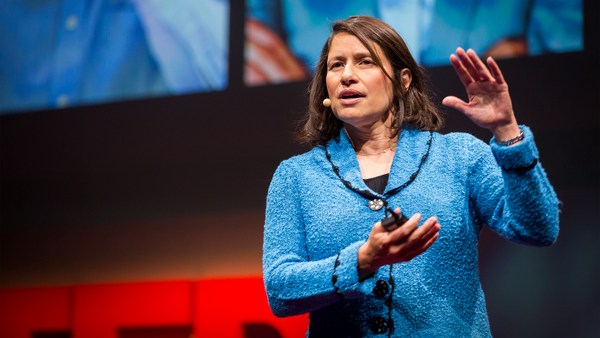I’m a middle child, and I was born leaning in. For as long as I can remember, I've had this insatiable desire to compete, to accomplish and to prove myself. My energy isn’t easily contained, and I've been called by both men and women intense, high-octane, aggressive. These words don't feel like compliments to me. I try to control my eagerness. I try to be softer. It's exhausting.
(Laughter)
The truth is, this tough shell conceals sensitivities and insecurities that only those closest to me know. And yeah, my masculine traits make me the kind of gal that can hang with the guys, as long as I'm not their boss.
Last winter, I was walking through a ski resort and a man came up to me and said, "Excuse me, are you with a husband or a fiancée?"
"No," I said, and I continued toward the lifts.
And then curiosity got the better of me. And I turned around and asked the guy why he wanted to know if I was with a man.
"I'm selling timeshares. It's a real estate thing."
(Laughter)
"And you don't sell to women?"
"Oh, are you interested?"
"No."
(Laughter)
"But you do know women carry checkbooks, too?"
And at that, he looked at me and said, "Wow, lady, you're tough."
(Laughter)
Modern day sexism is different than it was in the past when a blatant comment about a woman's physique or a chummy pat on the derriere was tolerated, maybe even accepted. Today's sexism can be more subtle. Little nuances that might seem like no big deal to some, but their impact can have the effect of a thousand cuts. That day at the ski resort resulted in more than just another microabrasion. It sparked a curiosity in me about perceptions that we have for women versus men. I wanted to know why do we perceive women differently when we assert ourselves. So I did a little research and I came across something, just to make sure this wasn't all on my mind, called the competence/likability dilemma, where women, unlike men, are rarely perceived to be both competent and likable.
Now we should take a moment to define the word "likable." Merriam-Webster says "likeable" is: "having qualities that bring about a favorable regard, pleasant or agreeable." The Urban Dictionary says: "likeable, an adjective meaning pleasant or attractive. It describes something that is easy to like." The sad truth is, most of us don't find strong, competent women easy to like.
In 2003, Professor Flynn at Columbia Business School conducted an experiment. He took a case study about Heidi Roizen, a successful female venture capitalist, and he changed the name to Howard Roizen. Everything else about the case study remained the same. He gave half of his class the Heidi Roizen case study and the other half the Howard Roizen case study. And he asked the students to rate how competent and how likable Heidi and Howard were. Both female and male students found Heidi and Howard to be equally competent. But the students tended not to like Heidi. They thought that she was a little too aggressive and out for herself. Neither female nor male students wanted to work for or hire Heidi, but they all thought Howard would make a great colleague. Why? Because in our society, women are penalized when we behave in ways that violate gender norms. Our gender stereotypes show that women should be kind, nurturing, helpful, supportive, deferential, while traditionally men are expected to be decisive, competent, assertive and strong. So the dilemma for women is that the qualities which we value in leadership, such as assertiveness and decisiveness, go against societal norms of what it is to be a likable woman.
I'm a documentary filmmaker, so I'm nothing if not curious. But I've learned that being inquisitive is not an admired female trait. I was at a cocktail party last week, and I asked a man what line of business he was in.
“Fintech,” he said.
Curious. I dug a little deeper. "Oh, what type?"
"It's complicated."
(Laughter)
End of discussion. OK. Now it's possible that he wanted to spare me some long explanation, but it's more likely that his bias, implicit or not, informed him that as a woman I wouldn't understand finance. Either way, I'm fairly certain he wouldn't have said "it's complicated" had I been a man. I absorb the sting of one more cut.
Most of us are not aware of why we don't find strong women likable. There's just something about her that bugs us. But deep inside, at the root of this is an unconscious bias. Bias is a survival heuristic that we inherited from our ancestors. The problem is, it's unconscious. And as humans, we don't have the ability to recognize when we're being biased, even if we can see it in other people. We all, most of us, anyway, believe ourselves to be fair, open-minded and unbiased. And yet, I will admit, I too found Hillary's voice to be shrill. As long as society continues to associate leadership with masculine traits, female leaders will be judged more harshly, even when they outperform male counterparts.
So it's no wonder that in the United States, female politicians suffer greatly, as our elections tend to value likability over competency. Women hold only 25 percent of the seats in Congress.
The competence/likability dilemma has huge consequences, not just in politics, but also in education and in the workplace, where studies show that women in meetings with both genders are less likely to contribute knowledge. As women we're told to lean in, and yet there's backlash when we do. A recent study shows that women are not as good as men at negotiating for themselves. And yet, women outperform men when they negotiate on behalf of someone else. This is because women who negotiate for themselves are perceived as selfish, and women who negotiate on behalf of someone else are perceived to be helpful. And a helpful woman might be liked more than a woman who is assertive, but the helpful woman will not be recognized as having what it takes to be a successful leader.
Last week I was quoting my speaker fee to a potential client, and when I told him the price, he said to me, "Wow. Good for you. That's a lot. Isn't documentary filmmaking kind of, like, your hobby?"
(Laughter)
Ouch. As humans, we're limited to what we can do to mitigate our biases. So even if we were able to, say, implement a tool that would bring more women into upper management, it's highly likely that we would still evaluate the performance of those women with biased perceptions.
Clearly, leadership and likability should not be mutually exclusive for women or for men. So how do we solve for this dilemma? I wish I could offer you a cure to unconscious bias. I don't believe there is one. But we need to disrupt stereotypes and redefine what it is to be a leader and a woman. Obviously, this is a long-term solution that could take generations, but it's a vital step. We need to speak up. Speak up when you witness gender bias. Question comments that are made about a woman's appearance or personality rather than her skills or ability. And we need to slow down. Question yourself. Reconsider your snap judgments. Ask yourself, does that woman bug me for reasons that really matter? And forget about likability, ladies, women, if you can. Instead focus on being awesome. Be a smart, compassionate, effective leader that will redefine the stereotype of what a female leader is. I've wasted a lot of time worrying about how I am perceived. If I ask a lot of questions, will you find me combative? If I tell you about an accomplishment I'm proud of, you might think I'm conceited. But I need and seek the approval and recognition of my family, of my friends and of my colleagues. Like many of you, I want to be liked, and I'm hopeful for the day when women can be recognized as being competent and likable, a day when we value each other regardless of gender, for the unique contributions that we each bring to the table. That would be the day that I won't have to worry about being liked. I can just be me.
Thank you.
(Applause)





